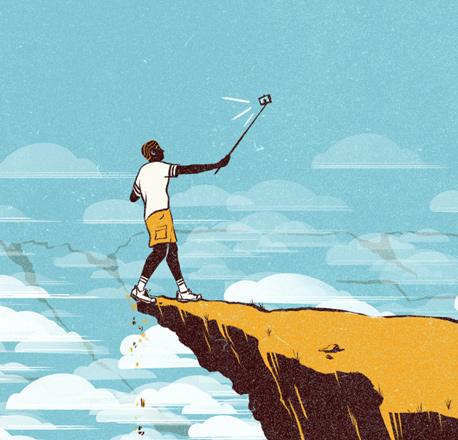You are here
People who post selfies are seen as less likable and less successful
By The Seattle Times (TNS) - Sep 18,2019 - Last updated at Sep 18,2019

Photo courtesy of petapixel.com
SEATTLE — If you care what other people think of your social media posts, you may want to think twice before uploading selfies, according to new research from psychologists at Washington State University (WSU).
In a study that will publish this fall in the Journal of Research in Personality, individuals who posted a lot of selfies were almost uniformly viewed as less likable, less successful and more insecure than people who posted more “posies” — that is, traditionally posed photos that appear to be taken by someone else.
WSU psychology professor Chris Barry worked with WSU students, as well as collaborators from the University of Southern Mississippi, to design a project intended to measure judgments of pictures posted on Instagram.
The team asked 30 students at the Mississippi school to fill out personality questionnaires and allow researchers to use their 30 most recent Instagram posts.
Those 900 images — stripped of hashtags, captions and information about the user and their followers — were shown to 119 WSU students, who were asked to rate the individual profiles on 13 attributes such as self-absorption, self-esteem, dependability and likability.
Across the board, the study found that people who posted more selfies were viewed to have lower self-esteem and to be more lonely, less dependable and less successful than who those who posted more “posies”, Barry said in a phone interview on Thursday.
“Even when two feeds had similar content, such as depictions of achievement or travel, feelings about the person who posted selfies were negative and feelings about the person who posted ‘posies’ were positive,” he said.
Barry said he began researching possible links between Instagram activity and personality traits about five years ago, when the theory took hold in pop culture that people who took lots of selfies were likely more narcissistic and self-absorbed than average.
But several studies found no correlation between selfie posters and narcissistic personality traits (as measured by affirmative responses to statements like, “I like to look in the mirror,” “people like to hear my stories” and “the world would be better if I ran it”), Barry said.
People’s motivations for how, when and why they post what they post on social media can be complicated and nuanced, but the WSU study’s findings are worth keeping in mind, he said.
Those without a friend (or a so-called “Instagram husband”) available to snap a pic can try using a self-timer to take their own posed photos from farther away than arm’s length. The WSU researchers found that even if a photo that appears to be a “posie” was, in fact, taken by the subject, it was still perceived more positively than obvious selfies.
“It’s definitely in the eye of the beholder,” Barry said.
A better solution, though, might be to stop being concerned about social media at all.
“It can be very hard when we get focused on number of likes or how many followers we have or the number of interactions,” said Keely Kolmes, a San Francisco-based psychologist with expertise in social media matters.
Kolmes recommends people unplug once in a while and engage with the world around us instead.
“Walk in nature, connect with friends off of technology, practice mindfulness and remember that there is a lot of world off of your phone too,” Kolmes said. “It is about keeping things in balance.”
Lisa Levine, a Seattle-based life coach, said that while the dopamine high we get from receiving attention on social media is real, the legitimacy of the litmus test is not.
She admits even she sometimes gets sucked into the social media “compare and despair” syndrome.
“I have to remind myself, and not infrequently, that those likes don’t really mean anything,” she said. “It can take over in a way that’s not healthy, but the counterbalance is to not care, put down your phone and walk away.”
By Christine Clarridge
Related Articles
If you were not already aware of it, I would like to inform my readers that Hong Kong is the most selfie-obsessed city in the world.
Smartphones might ironically be the answer to selfie-related deaths, two wilderness medicine specialists say. Hundreds of people have l
It is the inescapable 21st-century vexation of the vain.


















